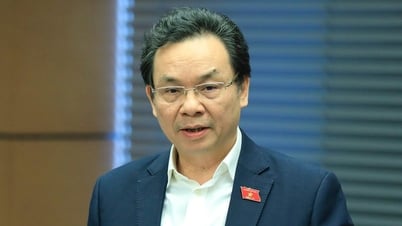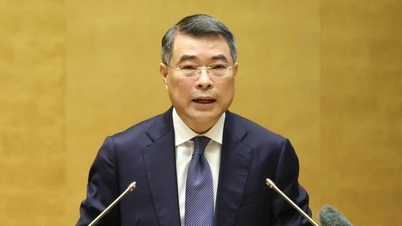Many extra-budgetary state financial funds (FFS) managed by the Central Government have revealed limitations in their operations, low efficiency in capital use, and overlapping tasks with the state budget and the Vietnam Bank for Social Policies. Faced with this situation, the State Audit Office (SA) has recommended rearranging the FFS managed by the Central Government.
Basic funds comply with financial regulations
According to Report No. 609/BC-CP of the Government on the implementation of the 2024 financial plan and the expected 2025 financial plan of extra-budgetary financial funds managed by the Central Government, there are currently 22 Funds managed by ministries and central agencies.
It is estimated that by the end of 2024, the balance of funds will be about 1.47 million billion VND, an increase of 3.97% compared to 2023. The balance of 3 funds managed by Vietnam Social Security accounts for 91.4% of the total balance of funds; 4 funds have a balance of less than 100 billion VND; 8 funds have a balance from 100 billion to 1,000 billion VND; 8 funds have a balance of over 1,000 billion VND.
According to the State Audit Office's assessment, in addition to the positive aspects, the audit results of the management and use of extra-budgetary state financial funds managed by the Central Government in the 2020-2023 period showed that the operations of these funds still have many shortcomings and limitations.
Currently, legal regulations related to the organization and operation of funds are designed into 3 groups: Regulations in laws and decrees, according to the Prime Minister 's Decision, according to the Decision of the Central agency. In fact, funds are organized according to 4 main methods: Specialized model, public service unit model, single-member LLC model and models that have not been specifically regulated.
Furthermore, the management apparatus among funds is also lacking in synchronization. Some funds are managed by concurrently holding positions of ministries and branches, so there are no costs incurred; while many other funds have established their own organizations, including: management board, control board and fund management board, leading to increased staffing and costs...

One of the major shortcomings of the current extra-budgetary financial fund system, according to the State Audit, is the duplication of spending tasks with the State budget and the Bank for Social Policies.
Although established with the aim of mobilizing resources from society, foreign organizations or the private sector, the financial resources of some basic funds are formed from the state budget. Some funds are initially provided with charter capital by the state budget, some funds are supported with regular funding, and some even continue to receive additional capital during their operations - which is no longer in accordance with the provisions of the 2015 State Budget Law.
Some funds have not yet generated revenue from their own mission activities and other sources such as the Vietnam Cooperative Development Support Fund.
"It is worth noting that many funds have their main source of revenue from... bank interest, such as the Vietnam Environmental Protection Fund, the Small and Medium Enterprise Development Fund, the Overseas Employment Support Fund...", according to the State Audit.
Perfecting fund management mechanisms and policies
From the assessments of audited central non-budgetary financial funds, the State Audit recommends studying the management mechanism for centrally-managed public financial funds organized in the direction of distinguishing between public funds operating under fund charters and specialized laws (including: Social Insurance Fund, Health Insurance Fund, Unemployment Insurance Fund and Debt Repayment Accumulation Fund) and the remaining public financial funds with appropriate management mechanisms.
Regarding the organizational model, research and arrange the TCNNS funds managed by the Central Government to ensure effective use of state budget resources. Arrange the fund management model in a streamlined and effective direction.
The State Audit believes that in some funds, it may not be necessary to have a separate apparatus, but only need ministries and branches to determine standards and criteria for enjoying incentives from the fund and entrust commercial banks and policy banks to lend to enterprises and enjoy incentives according to the fund's mission.
Regarding the salary regime, the State Audit proposed to review regulations on salary payments for financial funds outside the central budget to ensure consistency and fairness compared to other agencies of the state apparatus and commensurate with the performance of assigned tasks, and to evaluate the activities of the funds.
"Avoid the case where the fund mainly uses capital to deposit in banks but still receives high income according to the income level of a single-member limited liability company with 100% of charter capital held by the State," the State Audit noted.
The State Audit also recommends that the Ministry of Finance consider coordinating with relevant ministries to review in detail the use of capital sources at all funds, thereby identifying this as one of the criteria for evaluating the performance of the funds.
Source: https://vietnamnet.vn/nhieu-quy-tai-chinh-ngoai-ngan-sach-co-nguon-thu-chu-yeu-tu-lai-gui-ngan-hang-2402050.html


![[Photo] Prime Minister Pham Minh Chinh receives Rabbi Yoav Ben Tzur, Israeli Minister of Labor](https://vphoto.vietnam.vn/thumb/1200x675/vietnam/resource/IMAGE/2025/5/21/511bf6664512413ca5a275cbf3fb2f65)
![[Photo] Scientific workshop "Building a socialist model associated with socialist people in Hai Phong city in the period of 2025-2030 and the following years"](https://vphoto.vietnam.vn/thumb/1200x675/vietnam/resource/IMAGE/2025/5/21/5098e06c813243b1bf5670f9dc20ad0a)
![[Photo] Determining the pairs in the team semi-finals of the National Table Tennis Championship of Nhan Dan Newspaper](https://vphoto.vietnam.vn/thumb/1200x675/vietnam/resource/IMAGE/2025/5/21/eacbf7ae6a59497e9ae5da8e63d227bf)
![[Photo] Prime Minister Pham Minh Chinh receives the President of Asia-Pacific region of PowerChina Group](https://vphoto.vietnam.vn/thumb/1200x675/vietnam/resource/IMAGE/2025/5/21/0f4f3c2f997b4fdaa44b60aaac103d91)


























































































Comment (0)